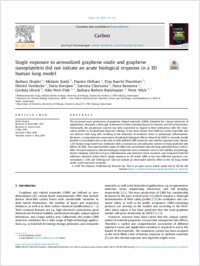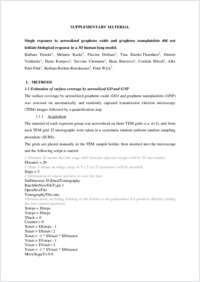Single exposure to aerosolized graphene oxide and graphene nanoplatelets did not initiate an acute biological response in a 3D human lung model
- Drasler, Barbara BioNanomaterials Group, Adolphe Merkle Institute, University of Fribourg, Switzerland
- Kucki, Melanie Laboratory for Particles-Biology Interactions, EMPA - Swiss Federal Laboratories for Materials Science and Technology, St. Gallen, Switzerland
- Delhaes, Flavien BioNanomaterials Group, Adolphe Merkle Institute, University of Fribourg, Switzerland
- Buerki-Thurnherr, Tina Laboratory for Particles-Biology Interactions, EMPA - Swiss Federal Laboratories for Materials Science and Technology, St. Gallen, Switzerland
- Vanhecke, Dimitri BioNanomaterials Group, Adolphe Merkle Institute, University of Fribourg, Switzerland
- Korejwo, Daria Laboratory for Particles-Biology Interactions, EMPA - Swiss Federal Laboratories for Materials Science and Technology, St. Gallen, Switzerland
- Chortare, Savvina BioNanomaterials Group, Adolphe Merkle Institute, University of Fribourg, Switzerland - Laboratory for Particles-Biology Interactions, EMPA - Swiss Federal Laboratories for Materials Science and Technology, St. Gallen, Switzerland
- Barosova, Hana BioNanomaterials Group, Adolphe Merkle Institute, University of Fribourg, Switzerland
- Hirsch, Cordula Laboratory for Particles-Biology Interactions, EMPA - Swiss Federal Laboratories for Materials Science and Technology, St. Gallen, Switzerland
- Petri-Fink, Alke BioNanomaterials Group, Adolphe Merkle Institute, University of Fribourg, Switzerland - Department of Chemistry, University of Fribourg, Switzerland
- Rothen-Rutishauser, Barbara BioNanomaterials Group, Adolphe Merkle Institute, University of Fribourg, Switzerland
- Wick, Peter Laboratory for Particles-Biology Interactions, EMPA - Swiss Federal Laboratories for Materials Science and Technology, St. Gallen, Switzerland
-
01.10.2018
Published in:
- Carbon. - 2018, vol. 137, p. 125–135
English
The increased mass production of graphene related materials (GRM), intended for a broad spectrum of applications, demands a thorough assessment of their potential hazard to humans and the environment. Particularly, the paramount concern has been expressed in regard to their interaction with the respiratory system in occupational exposure settings. It has been shown that GRM are easily respirable and can interact with lung cells resulting in the induction of oxidative stress or pulmonary inflammation. However, a comprehensive assessment of potential biological effects induced by GRM is currently hardly feasible to accomplish due to the lack of well-defined GRM materials and realistic exposure data. Herein, a 3D human lung model was combined with a commercial aerosolization system to study potential side effects of GRM. Two representative types of GRM were aerosolized onto the lung epithelial tissue surface. After 24 h post exposure, selected biological endpoints were evaluated, such as cell viability, morphology, barrier integrity, induction of (pro-)inflammation and oxidative stress reactions and compared with the reference material carbon black. Single exposure to all tested GRM at the two different exposure concentrations (∼300 and 1000 ng/cm2) did not initiate an observable adverse effect to the 3D lung model under acute exposure scenarios.
- Faculty
- Faculté des sciences et de médecine
- Department
- Département de Chimie, AMI - Bio-Nanomatériaux
- Language
-
- English
- Classification
- Biological sciences
- License
-
License undefined
- Identifiers
-
- RERO DOC 323332
- DOI 10.1016/j.carbon.2018.05.012
- Persistent URL
- https://folia.unifr.ch/unifr/documents/307323
Other files
Statistics
Document views: 168
File downloads:
- pdf: 177
- Supplementary material: 137

